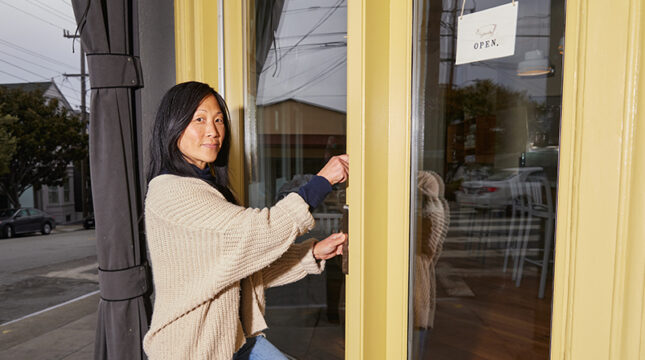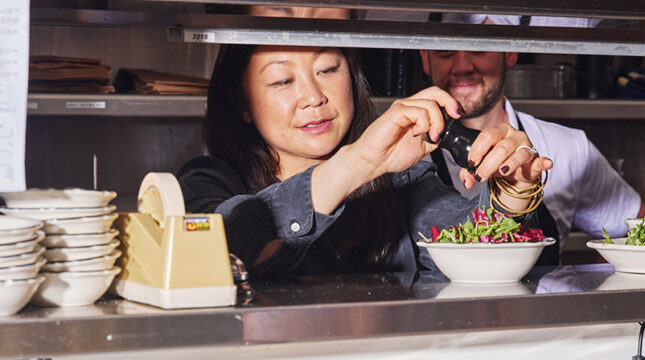Burstiner realized he wanted to own his own bakery business for two key reasons: Creative freedom and more income. “I had my own ideas, and you can only do that and have the freedom to do that if it’s your own thing,” says Burstiner.
Keep these steps in mind to help launch your own successful baking business.
Conduct market research for your bakery business
Make sure people are willing to buy what you bake. Do market research and better understand what your customers want. Work part-time at a business similar to the bakery you want to open to learn and observe.
New bakers can often sell their products:
- At community events like a farmers market
- Wholesale to restaurants
- Directly to customers online
- In an independent retail space
Burstiner networked with other specialty food sellers in the area and learned that there was a market for his baked goods in Tennessee, “Change to a location to find a market that doesn’t have or needs your product.” The state is not flooded with specialty foods in every community, and there is significant demand for more artisanal products like sourdough bread. “I came here because it was trending in that direction.”
Abide by the food laws and regulations in your area
If you’re considering a home bakery, you need to be familiar with your state, county, town or housing development business rules and cottage food laws.
You may only be allowed to sell certain foods from your home bakery. Or you may have to pass health inspections like a commercial kitchen.
You must also research rules for each municipality level, including zoning laws. Your town may have different laws from surrounding towns, and your HOA may not allow home businesses. Look at each level of rules before investing money in your home bakery business.
Calculate how much it costs to start a bakery
The cost of starting a bakery varies based on a number of factors, including:
- Rent
- Renovations or changes to your kitchen
- Equipment and supplies
- Licenses and permits
- Insurance
- Ingredients and inventory
- Utilities
- Labor
- Operating costs
- Technology like a POS system
Erik Burstiner, owner of Prevail Bakehouse, saw growth each of the five years he has been in business. He sells approximately 300 loaves a week, and during peak season brings in about $10,000 a month.
“To keep growing, you have to get a bigger oven, and to get a bigger oven, you need a bigger facility,” notes Burstiner. “I’m to a point where I feel like I have enough demand, and I’ve outgrown my equipment, so I’m going to do a big step up where I can probably double or quadruple my production.”
If you’re looking to lease a commercial space, try to find one similar to your business so you don’t have to pay for updates or renovations.
Write a bakery business plan
When you write a formal bakery business plan, it can help you anticipate and troubleshoot potential problems and set goals. A business plan is also usually a requirement for getting funding.
A business plan usually includes:
- Executive summary
- Company overview — including ownership structure
- Market analysis and customer profile
- List of products
- Management plan
- Marketing and advertising plan
- Financial projections — expenses and profits
Read more about writing a business plan for your small business.
Get funding for your bakery
Opening a commercial bakery requires significant startup cash; it may take months before your small business becomes profitable. And you will likely have to get a loan.
Some common ways to fund your bakery include:
- Commercial loans offer lower interest rates with larger amounts of money, but the borrower usually has to have a good credit score.
- A business line of credit is similar to a credit card.
- Small business loans can come from banks that partner with the Small Business Administration to offer lower interest rates.
- Equipment financing, which lets you use your equipment as collateral.
- Microloans can be great for very small ventures such as home bakeries that need just a small loan to get started.
Read our guide to funding your small business for more financing options.
Separate your personal and business finances
Be sure to document your business expenses and keep your personal and business expenses separate.
Burstiner warns new business owners to separate business finances immediately. He explains, “I didn’t formalize things from the start, and I should have had that documentation when the business started. Even if you file taxes with zero income, I should have done that, and I didn’t.”
He also urges new bakers to open a business bank account and establish a business credit score.
Burstiner had to backpedal and do these things, which has cost him time. He says, “You think you’re doing good because you have a high personal credit score, and then you go to a lender, and it’s like, ‘Oh, you have no credit.’”
“I should have done it earlier.”
Protect yourself and your bakery business with insurance
Chances are your lease agreement, local regulations or personal financial risk will require you to get small business insurance.
Bakery insurance is usually some combination of the following:
As Erik Burstiner’s business has changed, he’s updated his insurance policies to grow with his business.
Read more about bakery insurance costs.
Obtain bakery licenses and permits
First, you will need to register your business. This is a great opportunity to become an LLC or incorporate your business.
Once registered, every bakery needs to get licenses and permits. Requirements can vary at every level of the municipality. Check the state, county and city levels.
Read the complete guide to restaurant licenses and permits.
Hire and train staff
As you scale your business, you’ll need to delegate some tasks to employees. A typical bakery may hire:
- Front-of-house staff
- Bakers
- Skilled workers for baking and decorating
- Workers for cleaning, mixing, customer service and packaging products
When you let employees be a part of your business, you open yourself up to additional risk. This is why most states require businesses to have workers’ comp insurance. You may also need additional small business insurance beyond this, depending on your situation.
Read more about how to hire your first employee.
Market and advertise your bakery
Marketing and advertising are investments in your business. Set up a simple website and connect it to a Google Business profile so your customers can easily find you in Google Maps.
Additionally, use social media to capture the visual appeal of your baked goods. This is a powerful (and free!) advertising tool to help potential customers eat with their eyes.
Read more about how to market and advertise your business.






